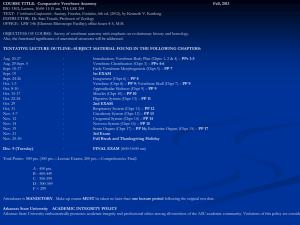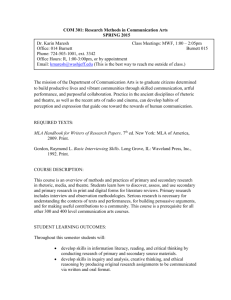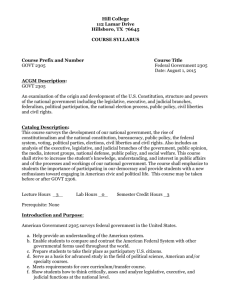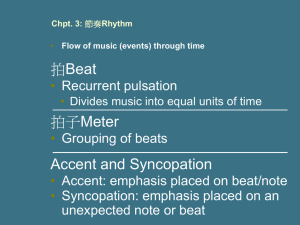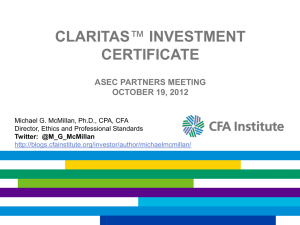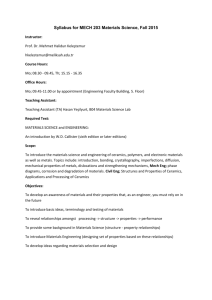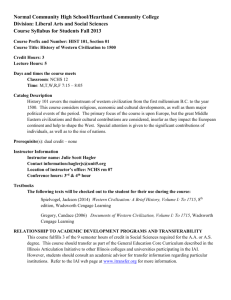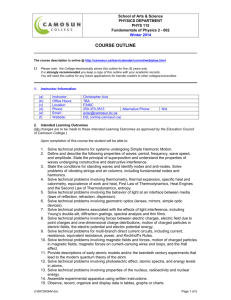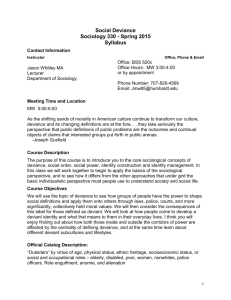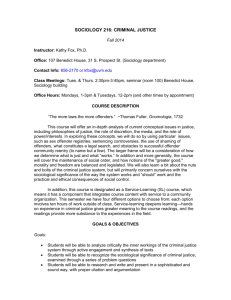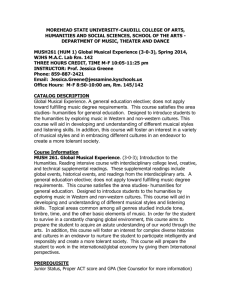90 -92% C+ 77-79% D 63-66%
advertisement
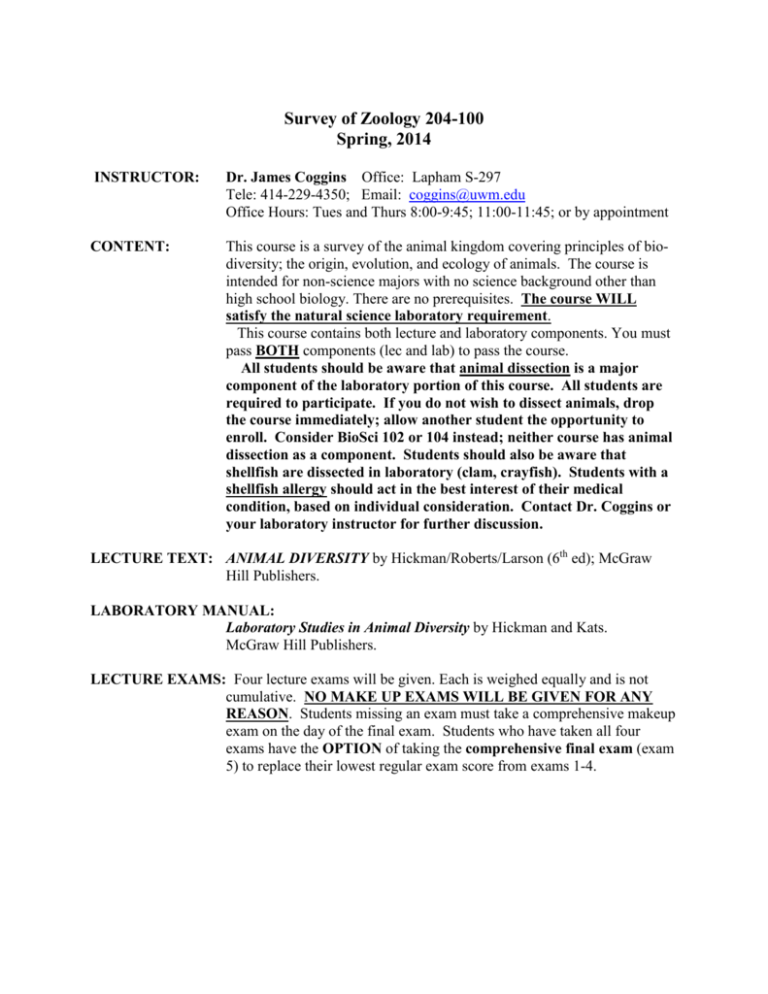
Survey of Zoology 204-100 Spring, 2014 INSTRUCTOR: Dr. James Coggins Office: Lapham S-297 Tele: 414-229-4350; Email: coggins@uwm.edu Office Hours: Tues and Thurs 8:00-9:45; 11:00-11:45; or by appointment CONTENT: This course is a survey of the animal kingdom covering principles of biodiversity; the origin, evolution, and ecology of animals. The course is intended for non-science majors with no science background other than high school biology. There are no prerequisites. The course WILL satisfy the natural science laboratory requirement. This course contains both lecture and laboratory components. You must pass BOTH components (lec and lab) to pass the course. All students should be aware that animal dissection is a major component of the laboratory portion of this course. All students are required to participate. If you do not wish to dissect animals, drop the course immediately; allow another student the opportunity to enroll. Consider BioSci 102 or 104 instead; neither course has animal dissection as a component. Students should also be aware that shellfish are dissected in laboratory (clam, crayfish). Students with a shellfish allergy should act in the best interest of their medical condition, based on individual consideration. Contact Dr. Coggins or your laboratory instructor for further discussion. LECTURE TEXT: ANIMAL DIVERSITY by Hickman/Roberts/Larson (6th ed); McGraw Hill Publishers. LABORATORY MANUAL: Laboratory Studies in Animal Diversity by Hickman and Kats. McGraw Hill Publishers. LECTURE EXAMS: Four lecture exams will be given. Each is weighed equally and is not cumulative. NO MAKE UP EXAMS WILL BE GIVEN FOR ANY REASON. Students missing an exam must take a comprehensive makeup exam on the day of the final exam. Students who have taken all four exams have the OPTION of taking the comprehensive final exam (exam 5) to replace their lowest regular exam score from exams 1-4. GRADE SCALE: Grades will be assigned using a scale similar to the one below: A 93-100% B80-82% D+ 66-69% A90 -92% C+ 77-79% D 63-66% B+ 87- 89% C 73-76% D60-62% B 83-86% C70-72% F 0-59% Final numeric grades are determined as follows: Lecture exams 60% of final grade Laboratory score 40% of final grade Remember: you must pass both lecture and lab to pass the course. COURSE WEBSITE: Materials for the course are available on a Desire to Learn (D2L) site. See the UWM D2L site for further information. ACCOMMODATIONS: Note taking and/or test taking accommodations may be arranged for students with certified special needs. Please inform instructor(s) [lecture and lab] early in the semester. UNIVERISTY POLICIES: Official university policies may be found at the Secretary of the University website: http://www.uwm.edu/SecU/SyllabusLinks.pdf 1. Students with disabilities 2. Religious observances 3. Students called to active military duty 4. Incompletes 5. Discriminatory conduct 6. Academic misconduct 7. Complaint procedures 8. Grade appeal process POTENTIAL BIOLOGICAL SCIENCE MAJORS: Students who intend to major in biological science should be aware that this course will NOT count toward the major. The course will be considered an elective but only 8 credits of 100 level work can count toward the BioSci major. Please see Prof. Coggins in person for more information. ANIMAL DISSECTION/SHELLFISH ALLERGY: All students should be aware that animal dissection is a major component of the laboratory portion of this course. All students are required to participate. If you do not wish to dissect animals, drop the course immediately; allow another student the opportunity to enroll. Consider BioSci 102 or 104 instead; neither course has animal dissection as a component. Students should also be aware that shellfish are dissected in laboratory (clam, crayfish). Students with a shellfish allergy should act in the best interest of their medical condition, based on individual consideration. Contact Dr. Coggins or your laboratory instructor for further discussion. Biology 100 Survey of Zoology Lecture: Lapham 162; Tuesday and Thursday 10:00-10:50 DATE (2013) Jan 21 Jan 23 Schedule of Topics LECTURE TOPIC READING ASSIGNMENT Course Introduction; Scientific Syllabus, Chpt 01 Method History of Evolution Chpt 01 Evidence for Evolution Jan 28 Chpt 01 Jan 30 Selection&Adaptation Chpt 01 Chpt 04 Feb 04 Animal Classification Feb 06 Animal Form and Function Lecture Examination 1 Chpt 03 All materials to date Animal-Like Protists Sponges Chpt 05 Chpt 06 Feb 20 Radiate Animals Chpt 07 Feb 25 Flatworms Chpt 08 Feb 27 Roundworms Chpt 09 Mar 04 Molluscs Chpt 10 Mar 06 Mar 11 Annelida Chpt 11 Lecture Examination 2 Materials Feb 16 - Mar 08 Arthropods I Spring Recess Chpt 12 Arthropods II Chpt 12 Echinoderms Chpt 14 Feb 11 Feb 13 Feb 18 Mar 13 Mar 16-23 Mar 25 Mar 27 Apr 01 Chordates; Vertebrates Chpt 15 Vertebrates; Fishes Chpt 15 Fishes Chpt 16 Apr 10 Amphibians Chpt 17 Apr 15 Lecture Examination 3 Materials Mar 15 - Apr 12 Apr 17 Reptiles Chpt 18 Apr 22 Birds Chpt 19 Apr 24 Birds Chpt 19 Apr 29 Mammals Chpt 20 May 01 Mammals Make-up Lecture/Snow Day Chpt 20 Lecture Examination 4 Materials April 21 – May 10 Apr 03 Apr 08 May 06 May 08 May 14 Wednesday Final Exam (Optional) and Make Up Exam 7:30-9:30 Lapham 162 7:30-9:30 Lapham 162 Note: The final exam (Exam 5) is optional. Students who take exam 5 and score higher than their lowest score on Exam 1, 2, 3, or 4, can replace their lowest score. Anyone who has missed one of the previous four exams must take exam 5 in order to have four exam scores for computation of final grade.

